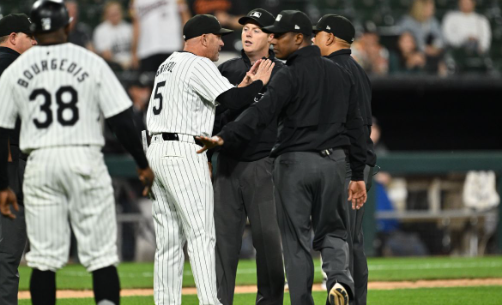
Thursday’s matchup between the Chicago White Sox and Baltimore Orioles concluded with an unusual call from the umpiring crew. Despite trailing 8-2 as the game entered its final inning, the White Sox mounted a comeback, scoring four runs and positioning themselves to potentially snatch victory with runners on first and second and only one out.
Andrew Benintendi’s hit resulted in an infield pop-up, causing Andrew Vaughn to retreat to second base while the shortstop, Gunner Henderson, moved to make the catch. However, Vaughn’s presence in Henderson’s path led the umpire, Junior Valentine, to deem it interference, although Vaughn’s obstruction was unintentional and minimal.

Criticism swiftly flooded social media directed at Valentine for his call, especially since the outcome would have been the same under the infield fly rule, whether or not the interference was called. The debate over whether Vaughn genuinely interfered with the shortstop added fuel to the controversy.
But why did the umpires enforce the interference ruling if it wouldn’t have affected the outcome?
According to MLB’s rulebook, a runner impeding a fielder’s attempt to make a play on a batted ball, regardless of intent, warrants an out. This stipulation provided the grounds for Valentine to call interference on Vaughn, irrespective of the situation’s intricacies.
Pedro Grifol expressed his acknowledgment that the umpires followed the rule in their decision-making, yet voiced his personal disapproval of the rule’s outcome, emphasizing that no game should conclude in such a manner, adding that it was solely his viewpoint.
Regarding another contentious issue, there’s debate over whether an umpire has the authority or should intervene with a call of interference on a play deemed an “infield fly.”
The infield fly rule dictates that an umpire can rule the batter out on “any fair fly ball which can be caught by an infielder with ordinary effort when first and second, or first, second and third, are occupied,” irrespective of whether the ball is caught. This rule aims to prevent teams from strategically letting fly balls drop to instigate a force out.
Following the game, Valentine asserted that the call of an infield fly does not influence a potential interference call.
“If interference is observed, it should be promptly called,” he emphasized.
Leave a Reply